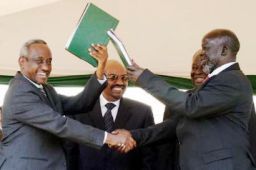Sudan peace process crucial to White Nile oil deal
LONDON, Aug 2, 2005 — Sudan’s fragile peace process will determine the fate of a major oil exploration deal following the death of the country’s first vice president John Garang, analysts said on Tuesday.

|
|
Sudan’s First Vice President Ali Osman Mohamed Taha (L) and Sudan People’s Liberation Movement leader John Garang show the signed peace accord at a ceremony in Kenya’s capital Nairobi, January 9, 2005. (Reuetrs) . |
UK firm White Nile still plans to drill for oil in the south of Africa’s largest country and says Khartoum has given assurances that it is “business as usual” after Garang was killed in a helicopter crash at the weekend.
But doubts linger.
“There are definitely challenges and obstacles that need to be overcome through the implementation of the peace process,” said Africa analyst David Mozersky of the International Crisis Group (ICG).
In January, southern rebel leader Garang signed a peace pact with the government of Sudanese President Omar Hassan al-Bashir to end two decades of civil war.
A month later, the former Sudan People’s Liberation Movement (SPLM) led by Garang, secured a promising oil deal with White Nile. It has sparked controversy ever since, with Khartoum disputing the SPLM’s right to award oil deals and French company Total claiming it has drilling rights to the block.
“Garang’s death has shaken up the big picture,” said Mozersky.
“But it’s more a question of having to cope with the loss of a tremendously popular and charismatic leader who came to embody the peace agreement rather than starting from scratch.”
Garang’s ally and successor, Salva Kiir, now steps into the breach. Analysts say although he lacks Garang’s authoritative grip on the country’s political and military structures, he commands considerable respect.
“It seems fairly clear that Kiir is well positioned to step into Garang’s official positions,” said Joshua Mandel of Control Risks Group.
A crucial task will be settling the White Nile dispute.
Under the pact, White Nile plans to acquire a stake in the 67,500 square km Block Ba in southern Sudan from Nile Petroleum, owned by the SPLM, in exchange for a 50 percent stake in the firm.
White Nile, which estimates that the block holds up to five million barrels of oil, remains bullish after Garang’s death. The firm said on Monday it was sent a “very strong message from Sudan that… going forward it will be business as usual.”
NEW OIL PANEL TO PLAY KEY ROLE
Sudan’s soon-to-be created National Petroleum Commission (NPC) will have the authority to deal with new oil concessions and may play a leading role in settling the White Nile dispute.
“If this tragedy can be overcome and the peace process can be kept on course, then hopefully the NPC will be set up and become a transparent regulatory body for the petroleum sector in Sudan,” said Mozersky.
Southern Sudan, in need of billions of dollars to rebuild after what was Africa’s longest-running civil war, is trying to attract investors to the region to tap its oil wealth.
Oil production, now at 320,000 barrels per day (bpd), comes mainly from fields in the south, where Chinese, Malaysian and Indian firms are the big investors.
(Reuters/Sudan Tribune)
